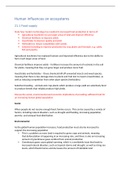Summary
Summary notes for CIE IGCSE Biology Topic 21: Human influences on ecosystems
- Course
- Institution
Complete revision notes for Topic 21 of the CIE IGCSE Biology course: Human influences on ecosystems. Explanations with diagrams for every specification point. These notes are written for candidates taking the Extended paper.
[Show more]




